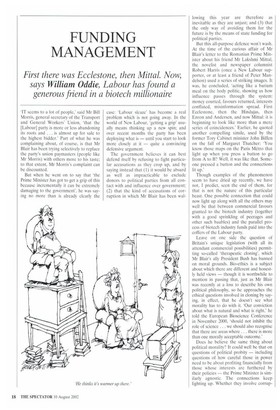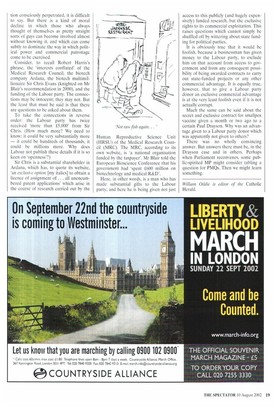FUNDING MANAGEMENT
First there was Ecclestone, then Mittal. Now,
says William Oddie, Labour has found a
generous friend in a biotech millionaire
IT seems to a lot of people,' said Mr Bill Morris, general secretary of the Transport and General Workers' Union, 'that the [Labour] party is more or less abandoning its roots and . . . is almost up for sale to the highest bidder.' Part of what he was complaining about, of course, is that Mr Blair has been trying selectively to replace the party's union paymasters (people like Mr Morris) with others more to his taste; to that extent, Mr Morris's complaint can be discounted.
But when he went on to say that 'the Prime Minister has got to get a grip of this because incrementally it can be extremely damaging to the government', he was saying no more than is already clearly the case: 'Labour sleaze' has become a real problem which is not going away. In the world of New Labour, 'getting a grip' usually means thinking up a new spin; and over recent months the party has been deploying what is — until you start to look more closely at it — quite a convincing defensive argument.
The government believes it can best defend itself by refusing to fight particular accusations as they crop up, and by saying instead that (I) it would be absurd as well as impracticable to exclude donors to political parties from all contact with and influence over government; (2) that the kind of accusations of corruption in which Mr Blair has been wal lowing this year are therefore as inevitable as they are unjust; and (3) that the only way of avoiding them for the future is by the means of state funding for political parties.
But this all-purpose defence won't wash, At the time of the curious affair of Mr Blair's letter to the Romanian Prime Minister about his friend Mr Lakshmi Mittal, the novelist and newspaper columnist Robert Harris (once a New Labour supporter, or at least a friend of Peter Mandelson) used a series of striking images. It was, he concluded, 'acting like a barium meal on the body politic, showing us how influence passes through the system: money courted, favours returned, interests conflated, misinformation spread. First Ecclestone, then the Hindujas, then Enron and Andersen, and now Mittal: it is beginning to look like more than a mere series of coincidences.' Earlier, he quoted another compelling simile, used by the former Tory Cabinet minister John Biffen on the fall of Margaret Thatcher: 'You know those maps on the Paris Metro that light up when you press a button to go from A to B? Well, it was like that. Someone pressed a button and the connections lit up.'
Though examples of the phenomenon seem to have dried up recently, we have not, I predict, seen the end of them, for that is not the nature of this particular beast. One possible connection that could now light up along with all the others may well be that between commercial favours granted to the biotech industry (together with a good sprinkling of peerages and other such baubles) and the parallel process of biotech industry funds paid into the coffers of the Labour party.
Leave on one side the question of Britain's unique legislation (with all its attendant commercial possibilities) permitting so-called 'therapeutic cloning', which Mr Blair's ally President Bush has banned on moral grounds. Bio-ethics is a subject about which there are different and honestly held views — though it is worthwhile to mention in passing that, just as Mr Blair was recently at a loss to describe his own political philosophy, so he approaches the ethical questions involved in cloning by saying, in effect, that he doesn't see what morality has to do with it. 'Our conviction about what is natural and what is right.' he told the European Bioscience Conference in November 2000, 'should not inhibit the role of science . . we should also recognise that there are areas where. . . there is more than one morally acceptable outcome.'
Does he believe the same thing about political morality? It could well be that on questions of political probity — including questions of how careful those in power need to be about profiting financially from those whose interests are furthered by their policies — the Prime Minister is similarly agnostic. The connections keep lighting up. Whether they involve corrup tion consciously perpetrated, it is difficult to say. But there is a kind of moral decline in which those who always thought of themselves as pretty straight sorts of guys can become involved almost without knowing it, and which can come subtly to dominate the way in which political power and commercial patronage come to be exercised.
Consider, to recall Robert Harris's phrase. the 'interests conflated' of the Medical Research Council, the biotech company Ardana, the biotech multimillionaire Sir Chris Evans (knighted on Mr Blair's recommendation in 2000), and the funding of the Labour party. The connections may be innocent; they may not. But the least that must be said is that there are questions to be asked about them.
To take the connections in reverse order: the Labour party has twice received 'more than £5,000' from Sir Chris. (How much more? We need to know: it could be very substantially more — it could be hundreds of thousands, it could be millions more. Why does Labour not publish these details if it is so keen on 'openness'?) Sir Chris is a substantial shareholder in Ardana, which has, to quote its website, 'an exclusive option Emy italics] to obtain a licence of assignment of . .. all unencumbered patent applications' which arise in the course of research carried out by the Human Reproductive Science Unit (HRSU) of the Medical Research Council (MRC). The MRC, according to its own website, is 'a national organisation funded by the taxpayer'. Mr Blair told the European Bioscience Conference that his government had 'spent £600 million on biotechnology and medical R&D'.
Here, in other words, is a man who has made substantial gifts to the Labour party; and here he is being given not just access to this publicly (and hugely expensively) funded research, but the exclusive rights to its commercial exploitation. This raises questions which cannot simply be shuffled off by wittering about state funding for political parties.
It is obviously true that it would be foolish, because a businessman has given money to the Labour party, to exclude him on that account from access to government and from any consequent possibility of being awarded contracts to carry out state-funded projects or any other commercial advantage. It is equally true, however, that to give a Labour party donor an exclusive commercial advantage is at the very least foolish even if it is not actually corrupt.
Much the same can be said about the secret and exclusive contract for smallpox vaccine given a month or two ago to a certain Paul Drayson. Why was an advantage given to a Labour party donor which was apparently not given to others?
There was no wholly convincing answer. But answers there must be, in the Drayson case and in others, Perhaps when Parliament reconvenes, some public-spirited MP might consider tabling a question for PMQs. Then we might learn something.
William Oddie is editor of the Catholic Herald.



























































 Previous page
Previous page